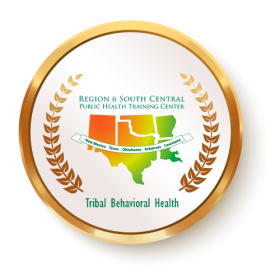
Tribal Behavioral Health 101: Overview of American Indian/Alaska Native Behavioral Health
Course Description:
Tribal Behavioral Health 101: Overview of American Indian/Alaska Native Behavioral Health is the first in a four-course learning series.
This course will present an overview of behavioral health in the American Indian and Alaska Native (AI/AN) populations. Behavioral health is inherently multi-faceted and affected by many factors including culture, socioeconomic status, family, the built environment, and historical factors.
Target Audience
Academic Faculty/Staff, Federal Government Employees, State Government Employees, Local Government Employees, Non-Government Employees and Students.
Learning Objectives
- Present an overview of behavioral health in the AI/AN population, including historical background and specific issues
- Describe existent different programs and organizations that seek to address or improve behavioral health and related challenges within the AI/AN population
- Identify behavioral risk factors
- Discuss data challenges related to behavioral health in the AI/AN population and in AI/AN communities
Instructors:

Munim Deen, MPH CPH
As a project coordinator, Mr. Deen worked with a variety of tribal health partners throughout Oklahoma on projects related to accreditation. Additionally, he has remained an active part of the Oklahoma Public Health Training Center’s efforts to develop courses related to American Indian/Alaska Native health.
Currently, he is the main analyst for a variety of CDC-funded projects undertaken by the Oklahoma Area Tribal Epidemiology Center and the Southern Plains Tribal Health Board.
As a part of his work, he remains up to date on research and findings related to American Indian/Alaska Native health issues. He makes use of various analytical tools and techniques in his work, including geographic information systems (GIS).
He holds an MPH in epidemiology and a BS in microbiology, both from the University of Oklahoma. He is also certified in public health (CPH) by the National Board of Public Health Examiners
Amanda Janitz, PhD, MPH, BSN
Dr. Janitz is currently an Assistant Professor of Research in Epidemiology in the Department of Biostatistics and Epidemiology at the University of Oklahoma College of Public Health. She works with the Southern Plains Tribal Health Board, the Association of American Indian Physicians, and Region VI South Central Public Health Training Center.
During her doctoral program, she worked with these organizations as a Graduate Research Assistant and consultant. Her dissertation research, which she completed in 2015, focused on the association between congenital anomalies and any childhood cancer and the association between air pollution and childhood acute leukemia.
Her areas of expertise include the epidemiology of childhood cancer, public health program evaluation, and epidemiologic methods. After graduating in 2006 with a Bachelor of Science in Nursing, she worked as a pediatric oncology nurse. In 2009, she completed a Master of Public Health in the University of Oklahoma College of Public Health with a focus on childhood cancer.
Upon graduation, she worked as a Research Nurse in pediatric oncology before returning to the University of Oklahoma in 2010 to complete her doctorate with a goal of contributing to cancer research in Oklahoma.
Janis Campbell, PhD
Dr. Campbell is an Associate Professor of Research at the University of Oklahoma, College of Public Health, Biostatistics and Epidemiology Department.
She also collaborates with the Oklahoma Area Tribal Epidemiology Center.
Dr. Campbell previously served as Chronic Disease surveillance coordinator for ten years and for five years as a program analyst for Maternal and Child Health Services at the Oklahoma State Department of Health. Dr. Campbell has 25 years of experience working in public health.
.
Amber Anderson, MPH
Ms. Anderson is a Research Epidemiologist at the University of Oklahoma College of Public Health.
A Citizen of the Cherokee Nation, she serves tribes and tribal organizations through health promotion and program evaluation initiatives.
In addition, she conducts public health research in a variety of realms to promote health and wellbeing among the American Indian/Alaska Native communities.
Available Credit
- 1.00 Participation/CETulane Professional and Continuing Education (PaCE) awards 1.00 hour(s) of credit for completing Tribal Behavioral Health 101: Overview of American Indian/Alaska Native Behavioral Health
Price
Required Hardware/software
System Settings
This course is designed to work most effectively if your computer and internet connection meet certain minimal requirements. This course can be accessed using a Windows 10 PC or a Mac with High Sierra1, Mojave, or Catalina. Pop-up blockers should be disabled when viewing the course. Internet Explorer 11 (for Windows 10), or the current version of Google Chrome, Mozilla Firefox, or Apple Safari (for Windows 10 and or Mac) is required. Many of our courses require Java and JavaScript enabled.
Links to External Websites
Links to websites outside this course will open in a new window or tab. Some browsers may minimize the course window. If this occurs, maximize the course window to return to the course.
Adobe Acrobat Reader (for desktops and laptops)
Adobe Acrobat Reader is required to access some documents in this course. If you need to download a free copy of Acrobat Reader, click here.
Internet Connection Speed
A minimum download speed of 1.5 Mbps is recommended for an optimal experience, which is commonly the speed associated with a basic DSL or a cellular/satellite connection. A faster connection, such as cable or fiber service, with further enhance your online experience. A Wi-Fi connection is generally acceptable, but it is dependent upon one of the two services mentioned above. You can check your internet connection speed at http://www.speedtest.net/.

 Facebook
Facebook X
X LinkedIn
LinkedIn Forward
Forward